Credit cards are not only for earning rewards and cash back, they are also a great tool for building credit. Below is a list of the best credit cards for fair credit that can help you improve your credit score, when used responsibly.
It’s important to remember your goal when getting a credit card designed for someone with fair credit. You should not be striving to get a ton of perks or rewards, because it is not realistic to do that with fair credit.
Your goal should be to find a credit card that you can get approved for, is affordable, and that you can pay on time in order to build your credit. Hopefully, it has a few perks or rewards as well, but that shouldn’t be the primary objective
What is Fair Credit?
Fair credit is usually defined as having a credit score between 580 – 669, on a range of 300-850.
Fair credit is a credit score between 580 – 669.
The exact definition of fair or average credit depends on who you ask, but I refer to these guidelines by Experian:
- 800-850: Exceptional
- 740-799: Very Good
- 670-739: Good
- 580-669: Fair
- 300-579: Very Poor
While having fair credit is certainly better than having bad credit or no credit, there is still room for improvement.
There are a ton of perks that come with having a good credit score, and one way to improve your credit score is by using a credit card responsibly to build your credit history, improve your mix of credit, and increase your credit limit.
If you want to get started now, you can apply for the best credit cards for fair credit here:
Note, with the list below, the recommended credit scores are based on 3rd party sites and do not guarantee approval for the card if you fall within that score.
9 Best Credit Cards for Fair Credit in 2021
1. Petal Visa Credit Card
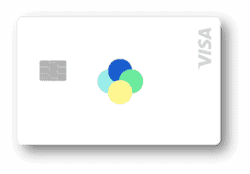
- Annual Fee: $0
- Rewards: 1% cash back on eligible purchases right away, up to 1.5% cash back on every purchase after making 12 on-time monthly payments
- Sign-Up Bonus: None
- Credit Recommendation: Fair or average
- Other Perks: Low ongoing APR (variable), Credit Limits of $500 – $10,000, 10% cash rewards with select merchant offers
The Petal Credit Card is highly regarded as a good starter credit card, designed for people with no, low, and fair credit.
It’s also a newer credit card which popped up in 2018.
If you are comfortable signing on with a newer company, then this card is a great fit for someone looking to build credit and get some great rewards along the way.
2. Capital One Platinum Credit Card
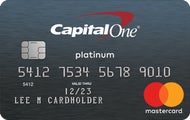
- Annual Fee: $0
- Rewards: None
- Sign-Up Bonus: None
- Credit Recommendation: Fair or average
- Other Perks: $0 fraud liability, mobile app, CreditWise credit monitoring
The Capital One Platinum Credit Card is a great credit building credit card offered by a big bank.
You can likely get approved with fair credit, and since the card charges no annual fees, you can keep it for a long time with no consequences.
The downfall is that this card does not offer any sort of fees or bonuses. Though, this is expected with most credit cards designed to help you build credit.
3. Capital One QuicksilverOne Credit Card
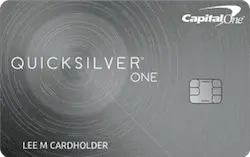
- Annual Fee: $39
- Rewards: 1.5% cash back on every purchase
- Sign-Up Bonus: None
- Credit Recommendation: Fair or average
- Other Perks: $0 fraud liability, mobile app, CreditWise credit monitoring
The QuicksilverOne Card is another great option from Capital One.
However, unlike the platinum card, this card offers 1.5% cash back on every purchase. This is one of the top offers I have seen in this category, but in exchange for this excellent rewards program, Capital One charges a $39 annual fee and has an above-average regular APR.
While this card is a great short term option for building credit, be wary of the annual fee that you will need to pay ongoing unless you cancel your card.
4. Alliant Visa Platinum Rewards Card
- Annual Fee: $0
- Rewards: 2 points per $1 spent
- Sign-Up Bonus: 5,000 bonus points when you spend $500 in the first three months
- Credit Recommendation: Fair or better
- Other Perks: $0 fraud liability, low introductory APR rates
The Alliant Visa Platinum Rewards card has a good intro APR offer, a $0 annual fee, and a very strong rewards program. Each point is worth about $0.01, which means this card offers 2% back on every purchase.
However, this is also one of the hardest cards to get approved for on this list and the credit needed is slightly better than other cards. I believe it is possible to get approved with fair credit, but you may, in fact, need good or excellent credit to get approved. Which would not be surprising given the generous rewards this credit union offers.
Last, the Alliant card is offered by Alliant Credit Union. You must be a member of the Credit Union in order to apply for the card.
5. Upgrade Card

- Annual Fee: $0
- Rewards: None
- Sign-Up Bonus: None
- Credit Recommendation: Fair or good
- Other Perks: Credit lines from $500 to $20,000, installment plan options
The Upgrade Card is another solid option for building credit with no annual fee.
Upgrade also offers a unique way to pay down existing balances with fixed, automatic payments each month. It could be a good way to save on interest and also keep you from deviating from a debt repayment plan.
Upgrade is another newer personal finance company that started in 2017. They plan to offer mobile banking in the near future as well, which could be a nice complement to their credit card.
6. Avant Credit Card
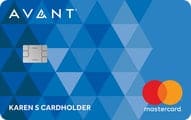
- Annual Fee: $29 – $39
- Rewards: None
- Sign-Up Bonus: None
- Credit Recommendation: Fair or good
- Other Perks: $0 fraud liability, fast and easy application, transparent fees
Avant was founded in 2012 with the goal to offer credit and loans in a fair and transparent manner. Avant is a newer company, but not compared to some of the latest fintech startups with only a couple of years in operation.
The biggest perk of the Avant Credit Card is you can build your credit without needing to put down a deposit. However, there is a low annual fee and no rewards or sign-up bonus to help offset that.
7. Indigo Platinum Mastercard

- Annual Fee: $0 – $99
- Rewards: None
- Sign-Up Bonus: None
- Credit Recommendation: Fair or good
- Other Perks: $0 fraud liability, previous bankruptcy okay
The Indigo Platinum Mastercard is clearly advertised as a credit card for someone with less than perfect credit – it’s written right on their website. Even if you have a recent bankruptcy, you still have a chance of getting approved for this card.
On the other hard, the card has an annual fee (usually), a relatively high APR, and no other monetary perks. It can be a good card to build credit, but not much else.
8. Credit One Bank Platinum Rewards Visa Credit Card
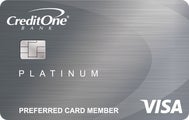
- Annual Fee: $0 – $99
- Rewards: 5% cash back on gas, groceries, cell phone services, internet, and cable or satellite TV service purchases on first $5,000 in spending, then 1%; plus 1% cash back on all other purchases
- Sign-Up Bonus: None
- Credit Recommendation: Fair or good
- Other Perks: $0 fraud liability, free credit monitoring
The Credit One Bank Platinum Rewards Visa card is another rare credit card for people with fair credit that offers rewards.
Yes, you have the chance to pay a relatively hefty annual fee of $99, but 1% cash back rewards on all purchases can offset that fee if you spend more than $10,000 annually.
9. Deserve EDU Mastercard for Students

- Annual Fee: $0
- Rewards: 1% cash back on all purchases
- Sign-Up Bonus: none
- Credit Recommendation: None Needed
- Other Perks: Amazon Student Prime membership, no foreign transaction fees
The Deserve EDU Mastercard for Students is designed for, you guessed it, students.
This student credit card has no annual fee and no credit history required, which makes it great starter card for college students. Plus, it even offers a generous 1% cash back on all purchases and a free Amazon Student Prime membership for each cardholder.
The card was originally designed to help international students build US credit – it has no foreign transaction fees and does require credit history or a social security number to apply. However, with the perks of this card, it can be good fit for every student.
Apply Today:
There are plenty of great fair credit cards available. Apply for your favorite, and start building your credit score today:
How to Choose a Credit Card for Fair Credit
Below are the six things you should consider when choosing a credit card designed for someone with fair credit.
1. Confirm Your Credit Score
First things first, you should check your credit score. Luckily, you can do that for free quickly and easily at a number of different places, including Credit Karma.
You want to make sure you are applying for the right card based on your score.
If you apply for a card below your credit range, you risk losing out on perks and rewards that better cards offer.
If you apply for a card above your credit range, you risk getting denied.
2. Check the Annual Fee
You should ensure that the credit card you are signing up for has a low, or ideally no, annual fee.
Naturally, this will save you money every year, which is always a good thing.
More than that, it will allow you to keep your card for a long period of time. One of the key factors that go into credit scores is your length of credit. If your card has no annual fee, there is no reason you cannot keep it for a long period of time, even as you hopefully add new and better cards to your wallet and no longer use the old one.
3. Minimize all Other Fees
Once you have minimized your annual fee, you should look to find a card with minimal other fees as well. These would include things like:
APR: APR, or Annual Percentage Rate, is the interest that you pay on any outstanding balances on your card. Ideally, you will pay your card on time and in full every month and never have to deal with an APR. However, if you do have to pay interest, the lower, the better.
Late Fees: Late fees are fixed payments on top of the APR that you have to pay if you carry a balance on your card.
Secured Card: Some credit cards for fair credit are secured credit cards. Secured cards require a security deposit in order to be opened. While you normally will get this deposit back if you use the card responsibly, it’s still a cost that you need to front, and one that is not required with an unsecured credit card.
Foreign Transaction Fees: This is the extra percentage fee you pay when using your card abroad.
4. Consider Rewards
Rewards are rare when it comes to credit cards for people with fair or average credit.
However, rewards cards do exist in this credit range. They may not be as lucrative as a premium travel rewards credit card, but something is better than nothing.
If you can get approved for a rewards card while also improving your credit, it’s a win-win.
5. Confirm it Reports to All Three Major Credit Bureaus
Minimally, your credit card should report to at least one of the major credit bureaus. Ideally, it would report to all three:
- Equifax
- Experian
- TransUnion
6. Explore Your Upgrade Options
Hopefully, you are not building your credit forever. At some point, you should have good credit and your goal should be to maintain it, not to build it.
When that time comes, you’ll likely want a better credit card than the one you are carrying now. Some credit cards offer upgrade options where you can seamlessly move from one card to a better one.
It’s a good option if you don’t want to cancel your old card and also don’t want to go through the hassle of applying for a new card again.
Explore Your Credit Building Options:
How to Improve Your Credit Score with a Credit Card
There are five components that make up your credit score. A credit card can help build your credit score by positively impacting nearly all of these factors.
- Payment History [35%]
- Utilization [30%]
- Length of Credit History [15%]
- New Credit [10%]
- Types of Credit [10%]
It’s important to note that building a credit score is a slow process. You need to be patient.
It can take months or even a year or two of good behavior for a score to recover and grow. Similar to a reputation, it only takes one bad act to destroy it and a lifetime (in this case, a year or two) to build up.
1. Pay Off Your Card Every Month
The best thing you can do to build your credit score is to pay off your credit card every month. Even one missed or late payment can have a significant negative effect on your score.
This helps to improve your payment history, and is the most important factor that goes into your credit score.
2. Maintain a Low Credit Utilization
Your credit utilization is a calculation that measures how much of your credit limit you are using.
If your credit limit is $1,000, and you routinely spend $300 a month with credit, then your utilization is 30%.
Opening a new credit card naturally increases your credit limit and lowers your utilization. Keeping a low utilization is good because it signals you are a responsible consumer not overusing your credit and therefore, at a lower risk of default.
3. Keep Your Credit Card for a Long Time
Keeping your credit card for a long period of time improves your credit history.
When you cancel a card, it will not disappear from your score right away, but after 7 years it will. That is why having a card with no annual fee is important because there is no reason to cancel that card ever. It can stay on your credit report indefinitely and help boost your credit history.
Bonus: Credit Mix (Credit Type)
Just by opening a new card, you will likely improve your credit mix. Having a wide variety of credit is a good sign to lenders that you can handle and pay back different types of loans.
While you should not open a new credit card solely to improve this portion of your credit score, it is a natural benefit if you do. You just have to be mindful of the short term negative impact that a hard credit check has on your score when opening a credit card.
What to do if You Are Denied For a Credit Card
Hopefully, you never have to deal with getting denied for a credit card. It happens though, and if it does, here are five steps you can take:
1. Find Out Why
First, find our why you got denied.
Credit card companies and issuers have to tell you the reason they denied your application. Whether by phone, mail, or email, make sure you get the rationale behind their decision. From there, you can take steps to improve your credit for next time.
2. Check Your Credit Score
Next, you should check your credit score or credit report.
Level set with where you are at, and see if the hard credit check from your previous application negatively impacted your score.
3. Lower Your Expectations
This might be the hardest step in the whole process, but it is usually necessary.
Unless the previously denied application was a one-off fluke, I would lower your expectations. You’ll likely need to apply for a card with fewer rewards and in a lower credit score range next time around in order to increase your odds of getting approved.
4. Wait 3 or More Months
On a similar note, don’t apply for a new card immediately. Having back to back hard credit checks can negatively impact your score and further damage your chances of getting approved for the card you want.
I would wait a few months before applying for a new card again.
In the meantime, practice good habits like making timely payments on current outstanding bills and other debts.
5. Apply for a New Card
After all of that, you can try to apply for a new card.
Just remember, it may be smart to apply for a card in a lower credit score range in order to help ensure you get approved this time around. If you were searching for a credit card for fair credit before, you might need to consider a credit card designed for someone with bad credit or poor credit.

Fair Credit Credit Cards Frequently Asked Questions (FAQ)
Question: How fast can credit be improved?
Typically it takes months, if not years to improve a credit score. The length of time is highly dependent on your current situation. If you are looking to establish credit, this might take 6 months to a year. However, if you are recovering from bankruptcy, that could take 5+ years.
Question: Are there credit cards for average or fair credit with instant approval?
Yes, there are. You’ll need to check the card’s application site for details on the approval process.
Question: What is the easiest card to get approved for?
Generally, it is easier to get approved for a secured credit card. Though, you should apply for a card based on your credit score and stage in life, not necessarily what is the easiest card to get approved for. Someone with excellent credit should not apply for a secured credit card.
Question: What is considered “Fair” or “Average” credit?
Fair credit or average credit is a credit score between 580 – 669.
Question: What is the best credit card I can get with fair credit?
A credit card with no annual fee and some type of rewards program is the best type of credit card that someone with fair credit should pursue.
Summary: Best Credit Cards for Fair Credit
Credit cards can be a great tool for building credit when used responsibly.
Finding the right credit card for you can help ensure you get approved, minimize fees, and build your credit the right way. Potentially, you can earn some rewards along the way too.
Apply today and start improving your credit:
Editorial Disclaimer: Opinions expressed here are the author’s alone, not those of any bank, credit card issuer, airlines or hotel chain, and have not been reviewed, approved or otherwise endorsed by any of these entities.
Just Start Investing is a personal finance website that makes investing easy. Learn the simple strategies to start investing today, as well as ways to optimize your credit cards, banking, and budget. Just Start Investing has been featured on Business Insider, Forbes, and US News & World Report, among other major publications for its easy-to-follow writing.
